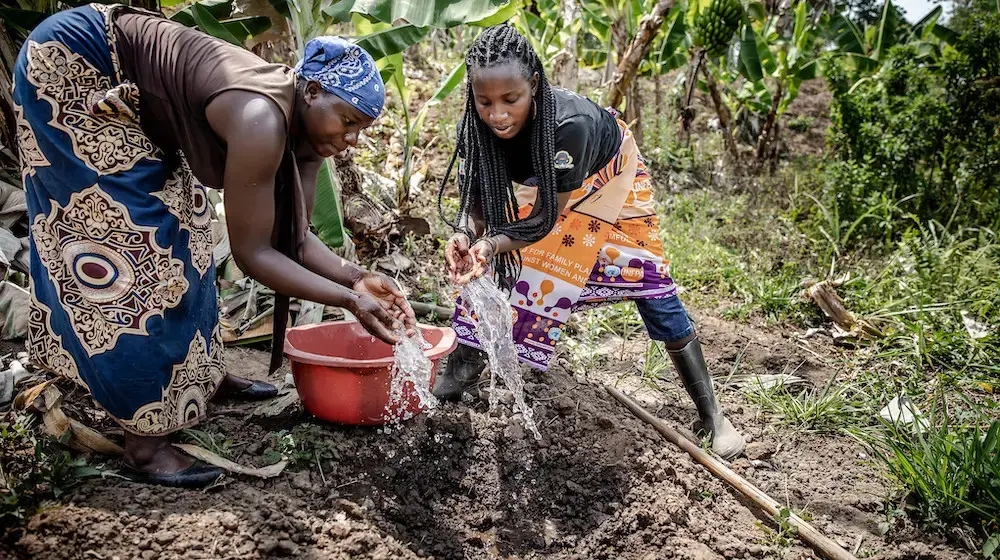Opinion editorial by Dr. Bannet Ndyanabanji, Regional Director a.i., UNFPA East and Southern Africa
The South of Madagascar, known as the Grand Sud, faces its most acute drought in 40 years amid ongoing sandstorms, a locust invasion and the COVID-19 pandemic. In the grip of a climate-induced crisis, entire communities are being plunged into extreme poverty and hunger. Inevitably, women and girls are the hardest hit. UNFPA and partners are scaling up the response to the crisis but more needs to be done, and quickly, to avert further deterioration of the sexual and reproductive health of women and girls.
After two years of dry rainy seasons in the Grand Sud, 35-year-old Mira from Amboasary, one of the districts severely affected by the drought, could no longer depend on farming to earn an income. She turned to transactional sex to survive and provide for her three children. Now pregnant with her fourth child, fathered by a man she does not know and cannot locate, Mira says she has no idea how she will cope with a newborn baby.
Driven by poverty and hunger, many women like Mira find themselves resorting to transactional sex, facing unintended pregnancies and increased risk of gender-based violence. As families’ desperation grows, so do cases of sexual exploitation, domestic abuse and forced marriage. UNFPA estimates that more than 400,000 women in the drought-affected regions are at risk of gender-based violence.
To compound matters, many women and girls cannot access essential sexual and reproductive health services, including family planning and maternal health care.
For many expectant mothers, like 18-year-old Hasy from Ampanihy District, the nearest health centre is a four or five-hour walk from home. Without money for transport and fearing that she may fall victim to crime if she ventures out, she will depend on the village matron to help her deliver. In the event of childbirth complications, she will have to make the arduous journey by cart or car if she is fortunate enough to find one to rent. Her family used to earn a living from their farm in addition to breeding cattle. Now they depend on the wild cactus growing on the land they previously cultivated for food and income.
Poor nutrition and the inability to access prenatal care puts both Hasy and her unborn baby at risk. Madagascar is grappling with a high maternal death rate of 408 deaths per 100,000 live births, a figure that has remained unchanged for the past ten years. Moreover, the percentage of skilled attendance at birth in the Grand Sud is lower than the national coverage of 46 per cent, reflecting challenges in accessing sexual and reproductive health services.
Working with the Ministry of Health to restore pre-crisis capacity and address immediate humanitarian needs, UNFPA has deployed 48 midwives to expand sexual and reproductive health (SRH) services at hospitals and health centres, as well as three mobile clinics taking SRH services to women and girls. In addition, 69 health facilities – out of 240 – have received emergency reproductive health kits that will cater for the urgent needs of more than 30,000 women and girls aged 15 to 49.
Following the development of a government-led humanitarian response plan in October 2020, supported by the United Nations and other development partners, 1.35 million people out of 1.5 million in need have been assisted in kind or in the form of a cash transfer. More than 100,000 children and women have benefited from health-care services.
To ensure a coordinated response, UNFPA and the World Food Programme are providing integrated sexual and reproductive health services, family planning information, nutrition services, and awareness-raising at food and cash distribution sites.
These initiatives have responded to immediate humanitarian needs while also laying the foundation for longer-term climate resilience for the communities in the Grand Sud that rely fully on agriculture for their livelihoods and nutritional needs.
As Madagascar enters the lean season without the buffer of previous harvests and bleak forecasts of rain and food production, thousands of families face the harrowing prospect of starvation. More resources are needed urgently to save lives and alleviate acute suffering. If we act fast, we can protect the gains made through the current response and ensure that those most at risk of being left behind are reached first.
Sexual and reproductive health needs do not stop in any crisis; in fact, they usually escalate. Our response must match the gravity of the needs. Even in a protracted crisis such as this, Mira, Hasy and millions of women and girls in the Grand Sud have the right to make decisions about their bodies, health and well-being. Let us ensure that their rights are protected urgently and at all costs.





